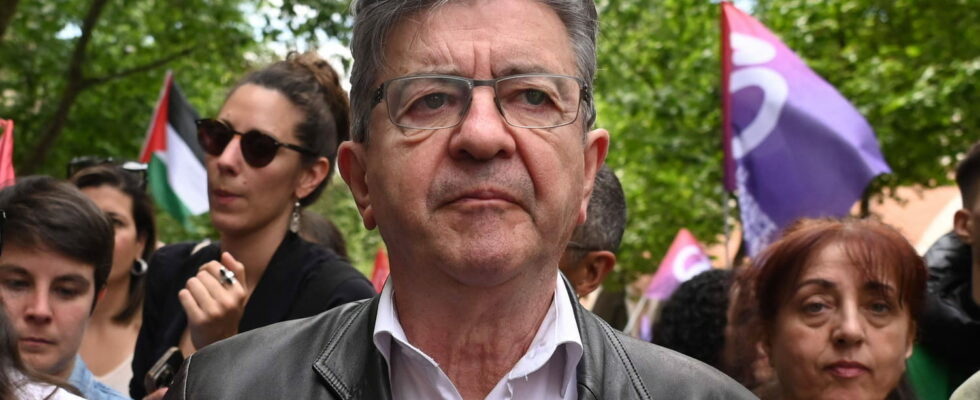Jean-Luc Mélenchon is not a candidate for the legislative elections but the question of his ambitions as Prime Minister is omnipresent in the campaign. Several of its partners, however, close this door.
“I don’t exclude myself but I don’t impose myself.” It is in these words that Jean-Luc Mélenchon has summed up several times his ambition to be Prime Minister in the event of the victory of the New Popular Front in the legislative elections. A position which was enough to unleash his adversaries as much as his partners: while the former set him up as a scarecrow of the left, the latter strive to deny any hegemony of La France insoumise over the popular bloc.
Does Jean-Luc Mélenchon really want to become Prime Minister? “I intend to govern this country,” declared the founder of LFI this weekend on France 5. “Two years ago, we ran a ‘Mélenchon Prime Minister’ campaign, I am not going to not tell you two years later ‘ah no, not me, I don’t know about it'”, recalled Mélenchon. But the latter also highlighted several figures from his party as potentially being able to lead a government: Manuel Bompard, Mathilde Panot and even Clémence Guetté. “I am not a candidate for anything,” he insisted Monday on France 2, adding: “I can be a minister among others or not be a minister at all.”
“No one can proclaim themselves Prime Minister”
It must be said that several leaders of the left oppose the hypothesis of “Mélenchon Prime Minister” with an increasingly categorical “no”. “I tell Jean-Luc Mélenchon, no one can proclaim themselves Prime Minister,” insisted the communist Fabien Roussel on Monday on France Bleu. Words taken up by the socialist boss Olivier Faure on “In the end, it will not be Jean-Luc Mélenchon,” Raphaël Glucksmann already insisted on June 14 on France Inter.
Even the rebellious François Ruffin quickly made the observation: “In all honesty, during the first door-to-door visits, his name came up, and with concern. And that is why I think he is right to put himself in withdrawal”, noted the deputy for Somme in the Courrier Picard, before concluding: “It seems obvious that he will not be Prime Minister.”
How will the Prime Minister be chosen?
The question remains how the candidate for the post of Prime Minister will be chosen in the event of a victory by the New Popular Front in the legislative elections. Initially, the parties seemed to have agreed that the majority group in the Assembly following the legislative elections would propose a Prime Minister to the rest of the coalition. But the First Secretary of the PS, Olivier Faure, then called for a vote to be held within the left. “The NFP deputies, in conjunction with their parties, will choose the personality who creates consensus to unite the country,” he tweeted again on June 24.
An option which, however, does not suit the leadership of La France insoumise: “It will be the group with the most deputies which will propose a name” at the end of the legislative elections, Manuel Bompard reaffirmed, Friday June 21. An idea supported by Jean-Luc Mélenchon a few days later. Not surprising, since LFI is the party which presents the greatest number of candidates within the New Popular Front. From then on, the rebels would have the advantage to propose a Prime Minister. The fact remains that by choosing Jean-Luc Mélenchon, they would take an obvious risk of shattering the New Popular Front.
The last word goes to Macron
Another important parameter: ultimately, the choice of Prime Minister will come down to Emmanuel Macron. So even if the New Popular Front obtains an absolute majority in the National Assembly at the end of the legislative elections, the President of the Republic retains relative freedom of movement.
Furthermore, the most likely scenario is that no bloc obtains an absolute majority in the hemicycle. In which case Emmanuel Macron would try to build a coalition government. His choice of Prime Minister would then probably fall on a more moderate figure than Jean-Luc Mélenchon, for example a socialist. Another major threat for the union of the post-election lefts.
